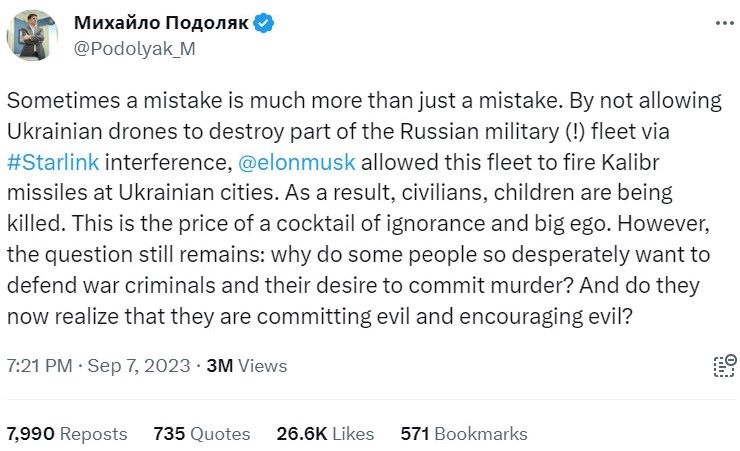Elon Musk thwarted Ukrainian attack on Sevastopol by shutting down Starlink
The CEO of the private aeronautic company SpaceX secretly instructed his engineers to deactivate the Starlink satellite communications network along the Crimean coast last year. The American businessman and richest man on the planet, according to an excerpt from Walter Isaacson's forthcoming biography "Elon Musk," thus thwarted a planned Ukrainian surprise assault on the Russian naval fleet, the CNN reports.
As Ukrainian submarine drones, armed with explosives, approached the Russian fleet, they lost connectivity and safely washed ashore, Isaacson claims in the book that is scheduled for release by Simon & Schuster on 12 September.
Mykhailo Podolyak, an advisor to the head of the Office of President Volodimir Zelenski, criticized the billionaire’s move.

Musk's decision, which prompted Ukrainian officials to plead for the reactivation of the satellites, was driven by his deep concern that Russia might respond to a Ukrainian attack on Crimea with nuclear weapons.
This fear was reinforced by Musk's discussions with senior Russian officials.
Musk, on the other hand, said that SpaceX's Starlink service was never active over Crimea and that the Ukrainian government made an "emergency request" to him to activate the service, specifically to Sevastopol, a port city in Crimea. He argued that complying with this request would have made SpaceX complicit in a major act of war and conflict escalation.
More to read:
Ukraine adopts UAV ammunition for serial production
Isaacson's new book sheds light on how Musk's fear of inadvertently contributing to a wider war led him to reject Ukrainian requests for Starlink systems, which were initially provided to Ukraine to maintain communication after Russia disrupted its communication systems just before the full-scale invasion in February 2022.
These Starlink terminals became vital for Ukraine's military operations, allowing them to maintain connectivity and communication even in the face of destroyed cellular and internet networks.
Musk's apprehensions about the nuclear scenario has not materialized as Ukrainians nonetheless bombed targets in Crimea and on Russian territory.

Starlink service running in Kyiv. Credit: Getty Images
Yet the billionaire maintains that Starlink is not intended for warfare but rather for peaceful purposes like entertainment and education. He argues that Ukraine's actions in Crimea are inviting nothing but strategic defeat.
SpaceX still funds the deployment of Starlink equipment to Ukraine and covers the costs of satellite exploitation by the Kyiv government.
Despite the initial disputes, SpaceX eventually reached an agreement with the U.S. and European governments to finance an additional 100,000 new satellite dishes for Ukraine at the beginning of 2023.
Starlink connection remains important for Ukrainian military and civilians alike, officials back in Kyiv admit. SpaceX actually saved Ukraine, The Economist asserts in a commentary on this topic.







